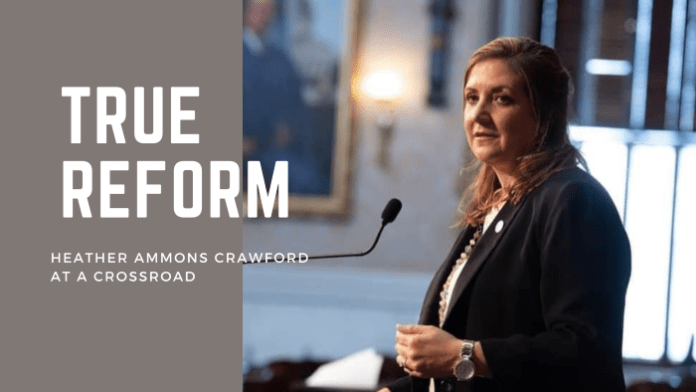An article MyrtleBeachSC News published Dec. 2022: Congressman Fry picks S.C. State Rep as Federal District Manager. She plans to keep both jobs is now under scrutiny because legal scholars say Socastee State Rep. Heather Ammons Crawford is in full violation of the Hatch act.
The Federal Hath Act states: All federal civilian executive branch employees are covered by the Hatch Act, including employees of the U.S. Postal Service. Even part-time employees are covered by the Act, and all employees continue to be covered while on annual leave, sick leave, leave without pay, or furlough. However, employees who work on an occasional or irregular basis, or who are special government employees, as defined in title 18 U.S.C. § 202(a), are subject to the restrictions only when they are engaged in government business. Federal employees fall within two categories under the Hatch Act, Further Restricted and Less Restricted.
By serving as U.S. Congressman Russell Fry’s Federal District Manager, Crawford falls into the “Further Restricted” class of Federal employees. As Fry’s Federal District Manager, Crawford serves as a Senior Executive Service [career positions described at 5 U.S.C. § 3132 (a)(4)]
- Persons employed in positions described under Sections 3132(a)(4), 5372, 5372 (a), or 5372(b) of Title 5, United States Code, including:
- Senior Executive Service [career positions described at 5 U.S.C. § 3132 (a)(4)]
- Administrative Law Judges [positions described at 5 U.S.C. § 5372]
- Contract Appeals Board Members [positions described at 5 U.S.C. § 5372 (a)]
- Administrative Appeals Judges [positions described at 5 U.S.C. § 5372(b)]
Prohibited Activities for Further Restricted Employees Include:
Further Restricted federal employees are prohibited from taking an active part in partisan political management or partisan political campaigns. Specifically, these employees may not campaign for or against candidates or otherwise engage in political activity in concert with a political party, a candidate for partisan political office, or a partisan political group. Such employees may not:
- Be a candidate for nomination or election to public office in a partisan election
- Take an active part in partisan political campaigns, by, for example:
- Campaigning for or against a candidate or slate of candidates
- Making campaign speeches or engaging in other campaign activities to elect partisan candidates
- Distributing campaign material in partisan elections
- Circulating nominating petitions
- Take an active part in partisan political management by, for example:
- Holding office in political clubs or parties
- Organizing or manage political rallies or meetings
- Assisting in partisan voter registration drives
- Use their official authority or influence to interfere with or affect the result of an election by, for example:
- Using their official titles or positions while engaged in political activity
- Inviting subordinate employees to political events or otherwise suggesting to subordinates that they attend political events or undertake any partisan political activity
- Solicit, accept or receive a donation or contribution for a partisan political party, candidate for partisan political office, or partisan political group by, for example:
- Hosting a political fundraiser
- Inviting others to a political fundraise.
- Collecting contributions or sell tickets to political fundraising functions
- Engage in political activity – i.e., activity directed at the success or failure of a political party, candidate for partisan political office, or partisan political group – while the employee is on duty, in any federal room or building, while wearing a uniform or official insignia, or using any federally owned or leased vehicle. For example, while at work employees may not:
- Wear or display partisan political buttons, t-shirts, signs, or other items
- Make political contributions to a partisan political party, candidate for partisan political office, or partisan political group
- Post a comment to a blog or a social media site that advocates for or against a partisan political party, candidate for partisan political office, or partisan political group
- Use any email or social media account to distribute, send or forward content that advocates for or against a partisan political party, candidate for partisan political office, or partisan political group
Rep. Heather Ammons-Crawford is up for reelection this coming 2024 primary season. She legally should have stepped down in December 2022.
Should she place her name on the Republican primary ballot, she will be in further violation of the Hatch Act.
Penalty for violation of the Hatch Act
The penalty structure for violations of the Hatch Act by federal employees includes removal from federal service, reduction in grade, debarment from federal employment for a period not to exceed 5 years, suspension, reprimand, or a civil penalty not to exceed $1,000.
5 U.S.C. § 7326(2). Note that this statutory maximum penalty amount is subject to annual adjustment by the Merit Systems Protection Board pursuant to the Federal Civil Penalities Inflation Adjustment Act Improvements Act of 2015. The current maximum penalty can be found at 5 C.F.R. § 1201.126(a).
A Choice
Heather Ammons Crawford makes $125,000 annually working as Congressman Fry’s Federal District Manager.
According to the Center for Public Integrity:
Look up the annual pay South Carolina’s part-time House and Senate members receive, and you’ll likely find this misleading amount: $10,400.
All House and Senate members are paid more than double that amount and many receive closer to four times that much, with most of the income coming in the form of $1,000-a-month payments for “in-district expenses” that are, in fact, treated as taxable income and are counted toward lawmakers’ pensions.
So, they really receive $22,400 as a baseline.
HEATHER AMMONS CRAWFORD IS AT A CROSSROAD
Ammons Crawford must decide which position she values more.
We have it on good authority, she will be questioned on this matter if she attempts to hold both positions by running for office in Spring 2024.

